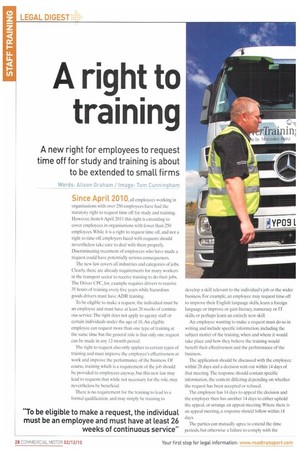A right to training
Page 28

Page 29

If you've noticed an error in this article please click here to report it so we can fix it.
A new right for employees to request time off for study and training is about to be extended to small firms
Words: Alison Graham / image: Tom Cunningham Since April 2010, all employees working in organisations with over 250 employees have had the statutory right to request time off for study and training. However. from 6 April 2011 this right is extending to cover employees in organisations with fewer than 250 employees While it is a right to request time off, and not a right to time off, employers faced with requests should nevertheless take care to deal with them properly. Discriminating treatment of employees who have made a request could have potentially serious consequences.
The new law covers all industries and categories of jobs. Clearly. there are already requirements for many workers in the transport sector to receive training to do their jobs. The Driver CPC, for, example requires drivers to receive 35 hours of training every five years while hazardous goods drivers must have ADR training.
To be eligible to make a request, the individual must he an employee and must have at least 26 weeks of continuous service. The right does not apply to agency staff or certain individuals under the age of 18. An eligible employee can request more than one type of training at the same time but the general rule is that only one request can be made in any 12-month period.
The right to request also only applies to certain types of training and must improve the employee's effectiveness at work and improve the performance of the business Of course, training which is a requirement of the job should be provided to employees anyway. but this new law may lead to requests that while not necessary for the role, may nevertheless be beneficial.
There is no requirement for the training to lead to a formal qualification, and may simply be training to develop a skill relevant to the individual's job or the wider business For example, an employee may request time off to improve their English language skills, learn a foreign language or improve or gain literacy, numeracy or IT skills, or perhaps learn an entirely new skill.
An employee wanting to make a request must do so in writing and include specific information, including the subject matter of the training, when and where it would take place and how they believe the training would benefit their effectiveness and the performance of the business.
The application should be discussed with the employee within 28 days and a decision sent out within 14 days of that meeting. The response should contain specific information, the content differing depending on whether the request has been accepted or refused.
The employee has 14 days to appeal the decision and the employer then has another 14 days to either uphold the appeal. or arrange an appeal meeting. Where there is an appeal meeting, a response should follow within 14 days The parties can mutually agree to extend the time periods, but otherwise a failure to comply with the procedure gives rise to a cause of action by the employee.
Employees have the right to be accompanied to any meetings by a colleague, and the time and place of the meetings must be convenient to all attendees.
Once received, requests should be considered seriously unreasonable refusals could have severe consequences. Requests should only be refused if one of the following applies: • The proposed study or training would not improve the employee's effectiveness in the business and would not improve business performance.
• The burden of additional costs.
• Agreeing the request would have a detrimental effect on ability to meet service user demand.
• Inability to reorganise work among existing staff.
• Inability to recruit additional staff.
• There would be an insufficiency of work during the periods the employee proposes being at work.
• There are planned structural changes during the proposed training period.
Employers need to remember that there are issues to take account of. First, discrimination law plays a role. All applications should be dealt with in the same way, mindful of any indirect discrimination issues that may arise from turning a request down.
The national minimum wage must be taken into account. Although technically there is no right to be paid for time off or for the course itself, time spent carrying out training "approved by the employer" during normal working hours counts for the purposes of the national minimum wage.
Attending work related training courses is usually included as -working time" for the purposes of the working time regulations. Attendance at training should therefore be monitored to ensure those who have not opted out are not working more hours, or with fewer breaks, than they are entitled to.
Finally, any employee who has made a request for time off for training is protected from suffering a detriment for having made the application.
Employers that fail to deal with a request properly, or at all, could find themselves on the wrong end of Employment Tribunal proceedings, or other fines.
































































































































